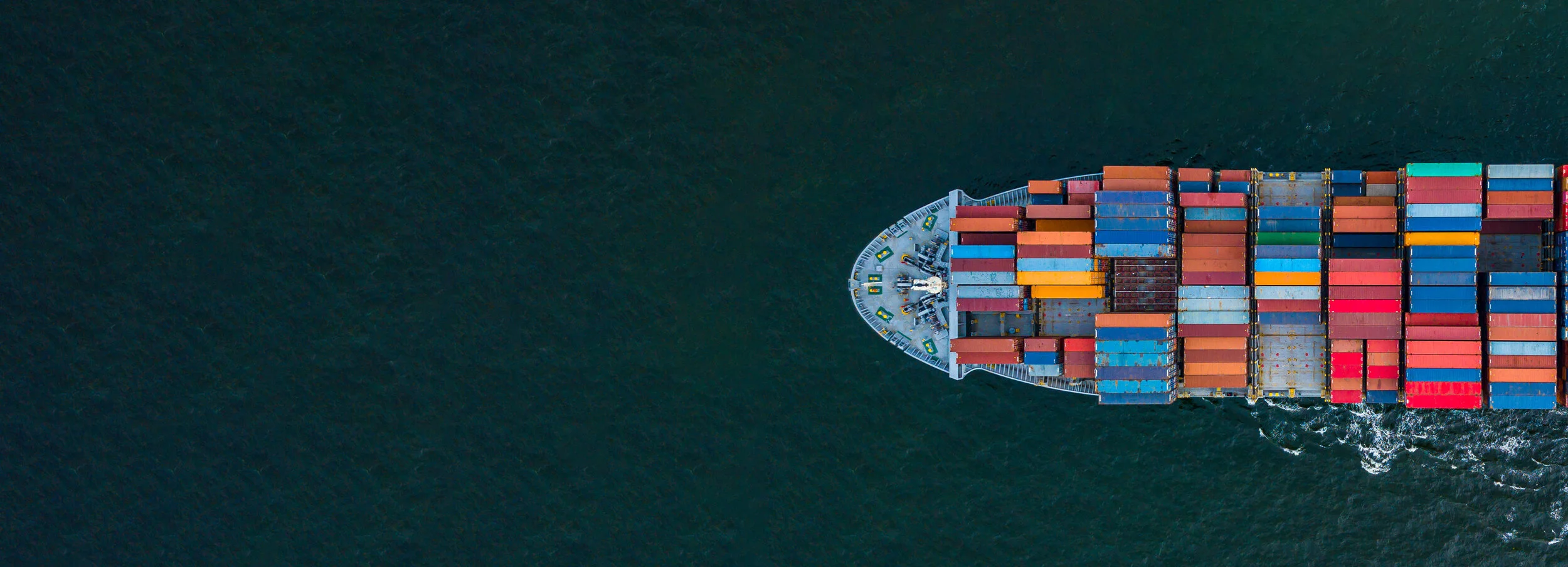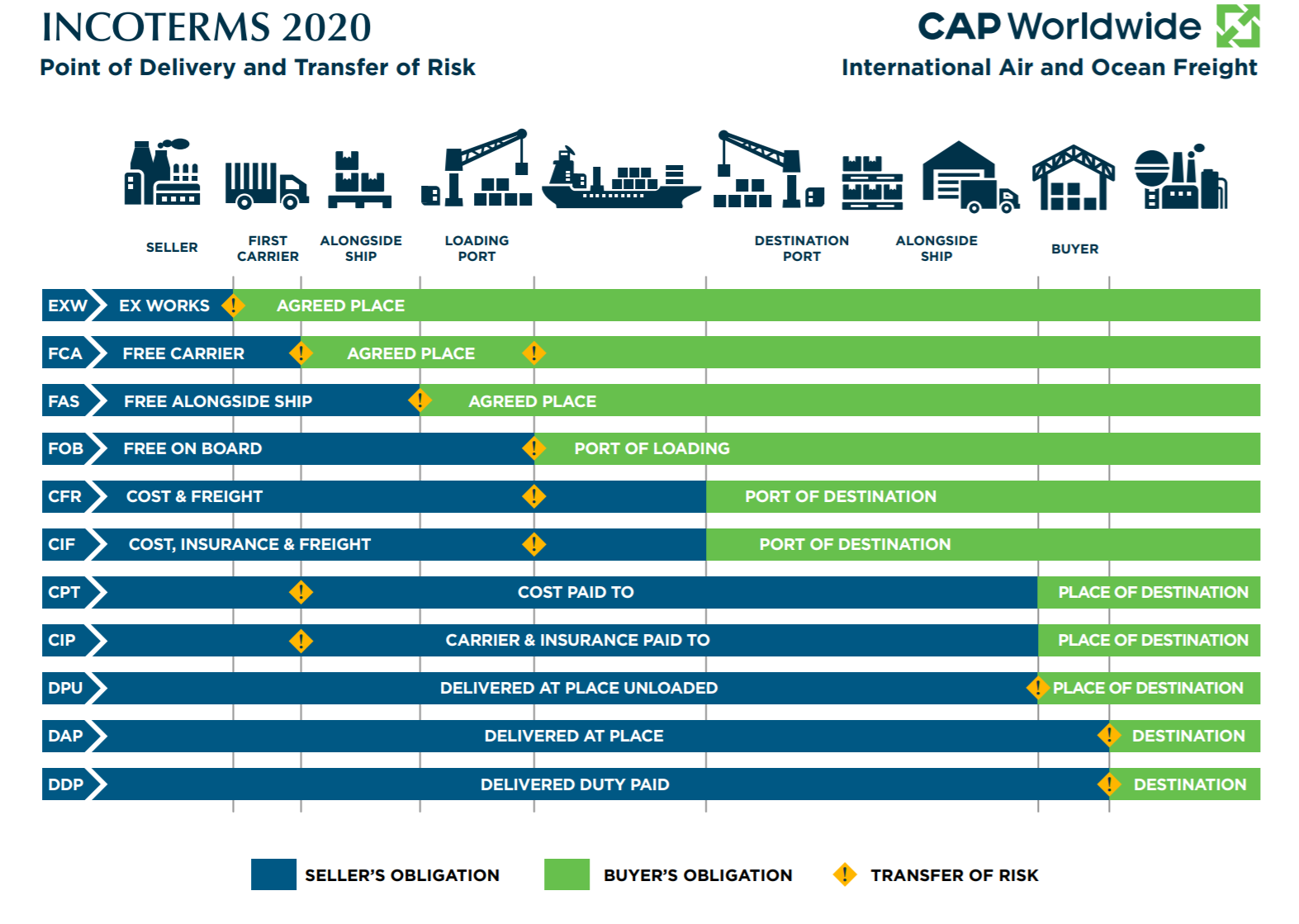What are Incoterms® 2020 Rules?
‘Incoterms®’ stands for international commercial terms. Incoterms® rules are a global standard set of pre-defined rules that help facilitate international trade by designating when and where delivery takes place. Developed by the International Chamber of Commerce, these rules describe which party is responsible for which tasks, risks, and costs. While they often seem complex to those that are unfamiliar, they are designed to be used as a shorthand to make international trade easier and better defined.
Start learning more today with Roy Becker, a retired international banker with years of experience using Incoterms® rules. In the full video, Roy goes through each of the Incoterms® 2020 rules and what they mean in plain english.
Why SHOULD YOU care about INCOTERMS® 2020 Rules?
International shipping is a complex process that involves many parties, each with their own interests and priorities.
If you're not familiar with the Incoterms® 2020 rules, it can be a struggle to work out an agreement that's good for both buyer and seller. This makes it difficult to have confidence with importing and exporting.
CAP Worldwide provides a full suite of customized transportation solutions. For international shipping, this often involves understanding and choosing the right Incoterms® 2020 rule that best supports your business interests. CAP Worldwide offers international logistics advice from experts who understand the ins and outs of global commerce. Our operations team will help you avoid unnecessary costs, wasted time, and missed opportunities so your business can focus on what matters most - growing your bottom line!
How do I choose an incoterms® 2020 Rule?
There may have to be a negotiation where the buyer and seller give and take based on what’s most important to each party. If you are still unsure which Incoterms® 2020 rule best protects your interests, just contact us at CAP Worldwide to help you and your business. Our operations team will be happy to listen to your situation and advise on which Incoterms® 2020 rule or rules put you in the ideal position for your international shipping.
WANT to learn more about INCOTERMS® 2020 Rules? Check out these INCOTERMS® 2020 Rules LEARNING RESOURCES
As Roy referenced in the video, there are two invaluable book resources to have on hand as a guide. First is the official Incoterms 2020 book published by the International Chamber of Commerce: https://iccwbo.org/resources-for-business/incoterms-rules/incoterms-2020/
For people in the United States, the second book recommendation is Frank Reynolds’ Incoterms for Americans: https://www.incoterms-for-americans.com/
INCOTERMS® 2020 Rules CHART
Click on the image to download a helpful Incoterms® 2020 Rules chart that can help you quickly recognize the different Incoterms® 2020 rules, and the corresponding tasks and risk associated with each. This chart is not intended to be used alone, and should always be used in conjunction with the Incoterms® 2020 rule book.
incoterms® 2020 Rules List
The following descriptions can be a helpful guide, though of course they can not be listed here in complete form, so still refer to the official Incoterms® 2020 Rules book and consult an expert advisor.
EXW - EX WORKS (or ex warehouse)
In Ex Works, the seller make the goods available to the buyer at the seller’s premises or at another named place such as the “works”, factory, warehouse, etc.
In this term, the seller does not need to load the goods on any collecting vehicle. Nor do they need to clear them for export.
FCA - FREE CARRIER
The seller is required to deliver the goods to the carrier or another person nominated by the buyer at the seller’s premises or another named place.
The parties are well advised to specify the place of delivery as explicitly as possible, as that’s where the risk passes to the buyer.
If the delivery occurs at a destination under the seller’s control, the seller is responsible for loading the goods.
FAS - FREE ALONGSIDE SHIP
The seller fulfills delivery when the goods are placed alongside the vessel (ex: on a wharf or a barge) nominated by the buyer at the named port of shipment.
The risk of loss or damage to the goods passes when the products are alongside the ship. The buyer bears all costs from that moment onwards.
FAS should only be used for non-containerized ocean freight or inland waterway transport.
FOB - FREE ON BOARD
The seller delivers the goods on board the vessel nominated by the buyer at the named port of shipment.
The risk of loss or damage to the goods passes when the products are on board the vessel. The risk of loss passes at that point and all costs thereafter will be borne by buyer.
CIF - COST, INSURANCE & FREIGHT
The seller delivers the goods on board the vessel. The risk of loss of or damage to the goods passes when the products are on board. The seller must contract for and pay the necessary costs to bring the goods to the named port of destination.
The seller also contracts for insurance coverage against the buyer’s risk of loss or damage to the goods during the carriage. The buyer should note that under CIF the seller is required to obtain insurance with only minimum coverage. If the buyer wishes to have more insurance protection, they will need either to agree as much expressly with the seller or to make their own extra insurance arrangements.
CPT - COST PAID TO (or Carriage paid to)
The seller brings the goods to the carrier or another person nominated by the seller at which point the risk transfers to the buyer.
The seller must contract for and pay the costs of carriage necessary to bring the goods to the named place of destination.
CIP - CARRIAGE & INSURANCE PAID TO
Seller has the same responsibilities as CPT, but then they also contract for insurance coverage against the buyer’s risk of loss of or damage to the goods during carriage.
Under the CIP rule, the seller is required to obtain insurance - though only minimum coverage. Should the buyer require more insurance protection, they need to form an agreement with the seller or make their own extra insurance arrangements.
DPU - DELIVERED AT PLACE UNLOADED (replaces Incoterm® 2010 Rule DAT)
DPU replaces the previous Incoterm® rule DAT (Delivered At Terminal). The seller delivers when the goods are unloaded and placed at the disposal of the buyer at a named place of destination.
The seller bears all risks involved in bringing the goods to the named destination including unloading.
DAP - DELIVERED AT PLACE
The seller has delivered once the goods are placed at the disposal of the buyer on the arriving means of transport ready for unloading at the named place of destination.
The seller bears all risks involved in bringing the goods to the named place of destination.
CFR - COST & FREIGHT
The seller delivers the goods on board the vessel, and the risk of loss of or damage to the goods passes when the products are on board.
The seller must still contract for and pay the necessary costs to bring the goods to the named port of destination.
DDP - DELIVERED DUTY PAID
The seller delivers when the goods are placed at the disposal of the buyer, cleared for import on the arriving means of transport ready for unloading at the named place of destination.
The seller bears all the costs and risks involved in bringing the goods to the place of destination. They must clear the products not only for export but also for import, to pay any duty for both export and import, and to carry out all customs requirements.









-EU Updates on Trade and Environment
-Brad Jacobs & QXO
-UN Convention on Negotiable Cargo Docs
-Amazon Air Cargo Moves